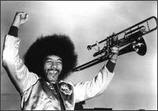- The objective standard makes reporters lazy; it is easy to find two official perspectives on an issue and harder to find out what is actually going on.
- Nobody is unbiased, so the rule of objectivity asks for dishonesty.
- The Society of Professional Journalists stopped including objectivity in their code of ethics in 1996.
- Newspapers in the mid-19th-century adopted objective journalism not as an ethical standard, but as a business practice to draw a wider range of readers.
- Avoiding bias is often avoiding the more crucial role of journalists in a society; to dig deep into controversial issues and undermine the status quo.
This is a scary time for journalists in terms of job security, but let's face it: A media overhaul has been long time coming. Journalists are supposed to be society's eyes and ears, and we have essentially been blind and deaf for the last decade-- all because reporters were afraid of Anne Coulter calling them out on liberal bias. The article also reminded me of a Poynter link I posted earlier today about changing ethical standards. Basically, I agree with Cunningham. I'm biased, and that's the point.

I like your point about objectivity making reporters lazy. I definitely agree that it's harder to find out the truth then to find out two people's versions of the truth. That being said what a reporter says is the truth is just another version of what could be the truth. I think that articles should just include as many reasonable opinions as possible include the writer's.
ReplyDeleteI think you are so right. I really like what you said here: "Journalists are supposed to be society's eyes and ears, and we have essentially been blind and deaf for the last decade-- all because reporters were afraid of Anne Coulter calling them out on liberal bias." I think it is time for journalist's to stop being afraid and dare to be honest about how they see things (like you are doing...)
ReplyDelete